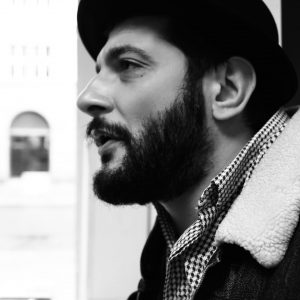Matteo Colombo
Italy|2018 2020 2021

Matteo Colombo has been translating American literature for the last twenty years. He has translated the works of Jennifer Egan, Dave Eggers, Michael Chabon, Donald Antrim, David Means and David Sedaris into Italian. He is also responsible for the latest translation of J.D. Salinger’s The Catcher in the Rye, published by Einaudi in 2014. He also translates features – for Internazionale, Vanity Fair, D: La Repubblica delle Donne – and theatrical screenplays (Red by John Logan for the Teatro Elfo Puccini in Milan, Duncan Macmillan’s Lungs for The Teatro Due in Parma, and – here in Santa Maddalena – Marjorie Prime by Jordan Harrison, for Milan’s Teatro Franco Parenti). He lives between Piemonte, Milan and Berlin, often switching place. He finds this to be the most interesting aspect of his job, as well as, in a way, its essence.
It’s nearly autumn when I arrive at Santa Maddalena. This has been a tricky year, filled with frequent, complicated twists and a sense of displacement. I haven’t had a home for months, so I’m flexible. For a few weeks, this can be it.
The first thing I see, on arrival, is a Sri Lankan landscape finger-drawn on the dusty rear window of a four-wheel parked just outside the villa. It will be my gateway to Manju, Rasika, Matteo and Isuru, the rich, warm subplot to my time here.
On the first night, after the first dinner with Beatrice, I’m reminded that people can disappear without warning. We flow seamlessly from lively-dinner-table to sparse-living-room chat, and then suddenly some of them are gone – off to bed, more writing or night-time thinking. This is something you can do, I realize.
So I cross the olive garden at night for the first time, on my way to the tower. The darkness is thick, the villa and the tower just specks of light. I can’t see but hear Jamaica scuttling around, following me discreetly, on her way to my bed. She’s adopted me on day one, and will stick to the point till the very last day. I’m her human, this time around. I hear she’s known to switch humans easily, but who can blame her? I can even relate to that, somehow, and just enjoy her puzzling presence. She’s like a fuzzy eager walking question mark, only coming into focus when she needs to chase thrown objects around the property. These night-time walks will set the pace of my time here, allowing me to sort out the words I’ve gathered during the day. Mostly, it’s my words. The silence is huge, a wide flat expanse that can be fun or terrifying depending on the day, so making out someone in the distance always feels good.
That’s why I love my occasional shared moment with Monica, at the tower. She’ll emerge – or rather descend – from her sunset-flooded nest on top of the tower around dinnertime. I’ll roll a cigarette for her, we’ll drink some wine. Update each other on what we think we have discovered about the mysterious ways this place operates, all the unspoken links and things we can fantasize about. A few days into the residency, I realize I can tell when Monica has had a good writing day. She’ll be content, laughing easily. Other times she’ll be restless – the high of making temporary sense of things having eluded her for the day.
There will be one long walk, my first and only foray into the surrounding hills. On that day, sunlight will come back with a vengeance after a few days of rain, and I’ll see bleach-white birches cut into a deep-blue sky, walking with Sean and Jamaica, speaking only when necessary.
What they say about this place is true: I’m not a writer, I just happen to share some of their tools, but this amount of beauty (of all kinds: storms can be loud and dramatic here, the wind tense, and it can feel like the whole place might be swept up in a second), paired with an inordinate amount of time, space and solitude, could expand anyone’s soul, and turn anyone hyper-productive. I’m done with the job I’d set out to do – a play about artificial intelligence, memory and growing older that resonates wildly as I navigate the villa and Beatrice’s stories – in less than two weeks. Then I start working on something else, a strange inner springtime taking over my soul, making it bloom with connections and plans. Because I’ve been given this priceless gift, I spend some time observing the giver, Beatrice. She seems to be really enjoying the human fresco she’s been curating for the past few decades, so I let myself enjoy being a stroke on her canvas.
